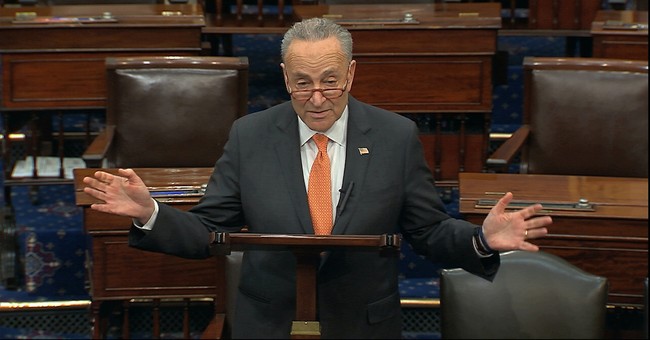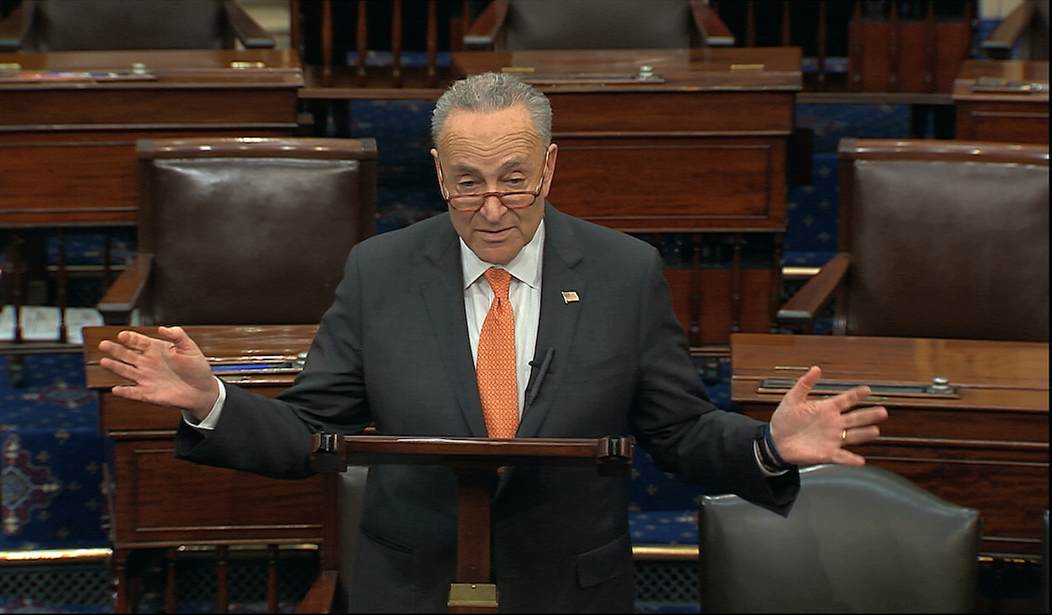
In this image from video, Senate Minority Leader Chuck Schumer, D-N.Y., speaks on the Senate floor at the U.S. Capitol in Washington, Saturday, March 21, 2020. (Senate Television via AP)
In a 96-0 vote, Senate representatives voted for the passage of a $2 trillion dollar stimulus package.
Early versions of the package reportedly added up to nearly $6 trillion in spending. Buried in the earlier versions was a “wish list” from Pelosi that included national ballot harvesting, green energy funding, and a grant for $25 million to the Kennedy Center For the Arts.
The final version trimmed most of Pelosi’s fat, but included a little union giveaway in regards to small business loans from the treasure, according to Fox News:
The legislation would provide one-time direct payments to Americans of $1,200 per adult making up to $75,000 a year, and $2,400 to a married couple making up to $150,000, with $500 payments per child. After $75,000 for individuals, the benefit would be reduced by $5 for each $100 the taxpayer makes, per Page 145 of the bill. A $150,000 limitation applies to couples, and a $112,500 limit for heads of households.
Gone from the bill are mentions of mandatory early voting, ballot harvesting, requirements that federal agencies review their usage of “minority banks,” and provisions curbing airlines’ carbon emissions — a Pelosi demand that even Saikat Chakrabarti, the former chief of staff to Rep. Alexandria Ocasio-Cortez and an author of the Green New Deal, called “ridiculous.”
“What’s not in the Senate’s bipartisan coronavirus bill: Pelosi’s outrageous wish list,” wrote GOP national spokesperson Elizabeth Harrington. “0 mentions of ‘diversity.’ 0 mentions of ’emissions.’ 0 mentions of ‘early voting.’ 0 mentions of ‘climate change.’ Good!”
At the same time, the bill satisfied some of Pelosi’s policy goals. Page 524 of the bill text indicates that many businesses that take a government loan would be obligated to remain neutral in any “union organizing effort” during the loan — a major giveaway to unions. Affected businesses would have between 500 and 10,000 employees.
And, Page 781 of the bill provides $25 million to the Democratic-controlled House of Representatives to cover “salary and expenses” — the same amount commercial air carriers will receive for employee “wages, salaries, and benefits,” according to Page 589 of the bill.
The bill will now go to the House and looks to be deliberated by Friday morning.














Join the conversation as a VIP Member